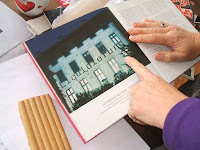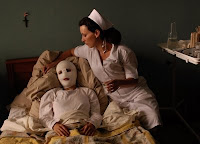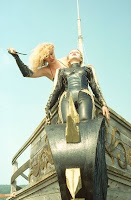
Featuring alongside the arrival of the re.act.feminism video archive this week at the Kunsthaus Erfurt is a retrospective of the women's performance group Exterra XX. Starting out as the Frauengruppe and then the Kunsterlingruppe and conducting its activities covertly while under Stasi surveillance under the old DDR regime, the group blossomed into Exterra XX and existed until 1994, when it disbanded.
Before that, however, the members put on "fashion object shows" and performances, made Super 8 films and founded the Kunsthaus Erfurt, which is returning the favour by staging this 25-year retrospective.
While attending re.act.feminism earlier this year in Berlin, I met two former members of Exterra XX, Verena Kyselka and Gabriele Stötzer. Both had been under Stasi surveillance and were considered enemies of the state. Nevertheless, they doggedly pursued their artistic ambitions, as well as sticking to their beliefs, which under the stifling conditions, is quite admirable. Amazingly, none of the women in the group informed on the others, though some of their own nearest and dearest, including Kyselka's partner at the time, did.
This became clear in the early 1990s, with the release of the files the Stasi held on anyone considered worth observing, which numbered millions. Both Stötzer and Kyselka have incorporated their Stasi files into their artwork (see pic for Kyselka with an image of a project in Erfurt). And in October Stötzer will be staging a recreation of a momentous event--the storming of the Erfurt Stasi offices in 1989.
It's an emotive topic. After we spoke at the conference, I emailed Stötzer for further comment and she sent her replies in German. I've been wanting to make this blog bilingual anyway, so here is some of our exchange, in which she discusses the re-staging and the difficulties of working in groups.
(KB) Could you say what you and the other four women did in invading the Stasi office? When was this? Was it planned? Was it a political act or a form of performance? What would you like to do with this performance you are planning in October?
(GS) die erste stasistürmung war in erfurt. es war am 4. dezember 1989... es war nicht geplant, die frauen sagen: es war notwendig und wir haben es gemacht. nach unserem anfangen und der erfahrung das die stasi nicht schiesst haben die anderen städte schnell die anderen stasizentralen eingenommen und dadurch viele akten vor der vernichtung gerettet.... ich will einerseits das durch die wiederholung der stasistürmung mit den authentischen personen dieses geschichtsbewußtsein wieder mit der wahrheit getränkt wird und das die frauen die damals spontan und politisch verantwortlich reagiert haben (und ihr leben aufs spiel setzten) diesmal ihr persönliches vermächtnis mit in die aktion bringen. damals mußten wir nur in den vorgefundenen verhältnissen reagieren, jetzt können wir unsere eigene persönliche vision mit in das geschehen geben. noch einmal klar: damals das war eine politische aktion, diesmal wird es kunst werden.
I was interested when you said that the women were all united until after the Wende. And that it's necessary to go your own way. What did you mean? And how do you feel about the reunited state and your place in it?
die frauengruppe war in der ddr eine form uns selber gegen das herrschende system, das anpassung verlangte, als individuum auszusprechen. dazu kam das innerhalb dieser gruppe jede einzelne sich über ihre eigenen grenzen hinaus entwickeln konnte und durch die gruppe geschützt war. wenn sich z.b. bei einer performance eine frau ausgezogen hat, wurde sie durch das normale umgehen der anderen frauen in der gruppe gestärkt. auch die angst vor den represalien wurde als gruppe gemeinsam besser ertragen. als dann die wende kam und wir ein kunsthaus gründeten, wurde nicht weiter nach frauenbildern oder unserer eigenen gruppendynamik geforscht. das haus existiert, weil es von außen finanziert wird und wir auf die anforderungen der finanzierer (stadt, ministerium) reagierten. ich bin weggegangen weil ich weiter allein für mich aus mir heraus schreiben wollte und nicht lesungen anderer in dem haus organisieren. nach der wende war der zusammenhalt gegen das system nicht mehr da. jede konnte sich allein retten und mußte es auch lernen. ich hatte bis dahin die leitung übernommen und habe mich selber abgesetzt, bzw. bin selber abgesetzt worden.
The re.act.feminism video archive and Exterra XX retrospective are showing at the Kunsthaus Erfurt from 21 April to 10 May. Gabriele Stötzer peforms on 19 April.

![Reblog this post [with Zemanta]](http://img.zemanta.com/reblog_e.png?x-id=6216b3e2-2331-4671-b9bd-25fa827911c0)

![Reblog this post [with Zemanta]](http://img.zemanta.com/reblog_e.png?x-id=be5a82c1-1796-4294-9bf2-c9eed9e9361f)

